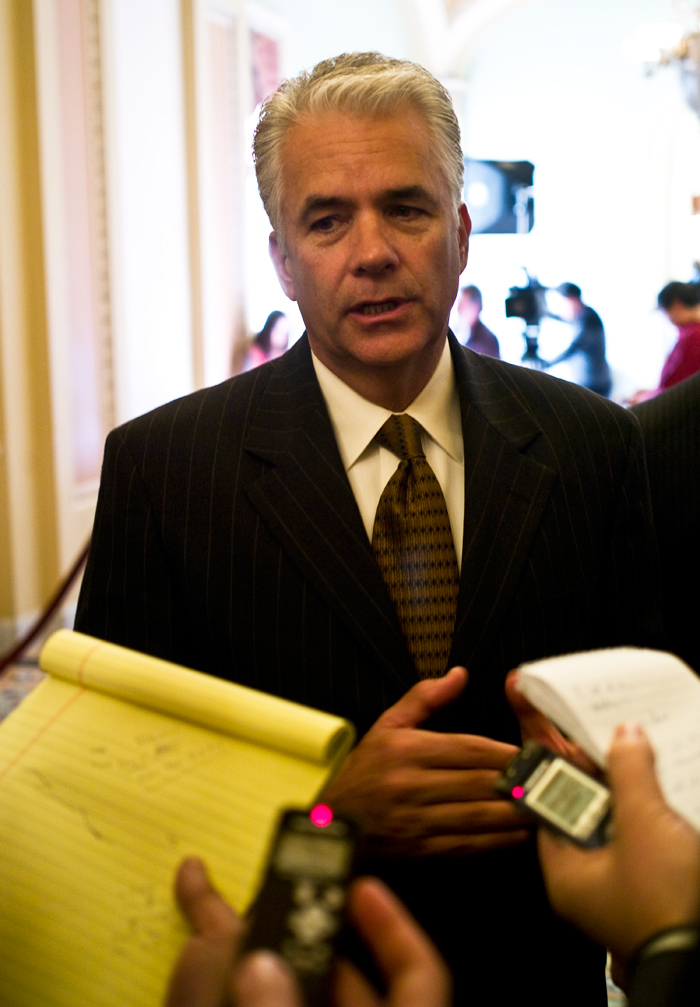Buried under the pile of details that have emerged in the last 48 hours on the John Ensign investigation is one crucial over-arching development: The federal probe into the matter appears to have expanded, and shifted its focus in a way that may could make it an even graver threat to the Nevada senator than before.
In a nutshell: The Justice Department investigation began as an inquiry into whether Ensign flouted a lobbying ban by trying to help Doug Hampton get a lobbying job after Hampton left Ensign’s office, and by directing his staff to work with Hampton once he was set up as a lobbyist. But now, it seems, investigators have also moved beyond Hampton, to consider whether the senator illegally tied legislative favors to contributions to the National Republican Senatorial Committee, which he chaired.
To be sure, a breach of lobbying rules, as may have occurred here, would be significant. But a direct quid pro quo involving Ensign — who continues to maintain that he has done nothing illegal — would potentially constitute far more serious wrong-doing.
What’s the evidence that the Feds have shifted their focus?
KLAS-TV reported yesterday that among the issues the Justice Department is looking at is the relationship between Ensign and eCommLink, a Las Vegas credit card company. The firm and several other local credit card firms, KLAS reported, had recently lost out on a bid for a federal contract, and wanted to boost their influence in Washington. Ensign’s office reportedly told the companies about proposed new credit card regulations that would hurt the industry, and said it would fight the proposals in exchange for a $28,000 contribution to the NRSC, which eCommLink gave. (Could those regulations be these?)
That contribution was engineered through Lindsey Slanker, the NRSC fundraiser whose husband, Mike — also a former Ensign aide — was working at Ensign’s behest to find Hampton a job.
Since that report, we’ve learned that both the NRSC and eCommlink have been subpoenaed by the grand jury. (Ensign’s office itself won’t say whether it has heard form the Feds.)
We’ve also learned that another Nevada company, Selling Source, has been subpoenaed. That may be significant for two reason:
First, Glenn McKay, Selling Source’s president, says that company founder and CEO Derek LaFavor met with Ensign in February or March of 2008 to discuss a possible campaign contribution — which was never given. “We’re a large company in Nevada, he was looking for money,” McKay told TPmmuckraker this afternoon, referring to Ensign. McKay added that to his knowledge, Ensign’s office had never brought up the issue of Hampton’s employment, though he made clear that he had not personally attended the meeting.
Second, Selling Source and LaFavor appear to have close ties to eCommLink. In 2006, a joint venture was announced between the two firms, and LaFavor was named CEO of eCommLink. (He no longer appears to hold that position.)
In other words, the Feds’ interest in Selling Source appears to relate to the same issue — the possible quid pro quo over campaign contributions — as does their interest in eCommLink.
That impression is bolstered further by the presence of another company on the list of reported subpoena recipients: PayCard USA. They’re another Nevada credit card firm that likely would have been impacted by the proposed regulations Ensign warned of. And online disclosure records indicate that PayCard USA’s CEO, Jim Hammer, gave $28,500 to Ensign’s NRSC in December 2007. The firm did not immediately respond to a request for comment.
None of this is to suggest that the original reason for the investigation — Ensign’s effort to get Hampton a lobbying job and help him succeed at it, as pay back for sleeping with Hampton’s wife and then firing him — is no longer of interest to the Justice Department. After all, the New York Times has laid out evidence that strongly suggests Ensign used his position to help Hampton’s clients, which is no small matter.
But, ominously for the Nevada senator, that could end up being the least of his worries.









